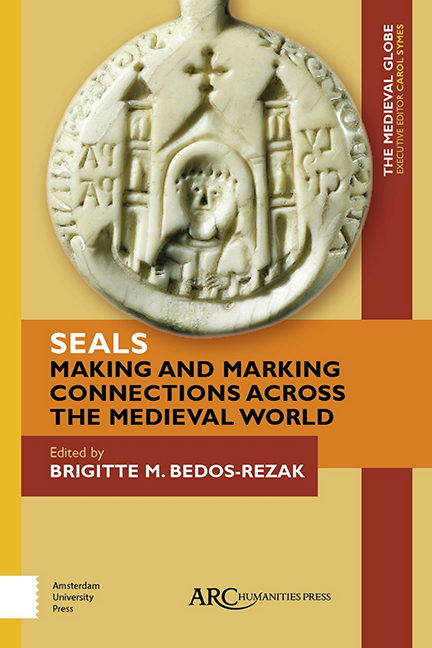Book contents
- Frontmatter
- Contents
- List of Illustrations
- Acknowledgements
- Cultural Transactions: An Introduction to Medieval Seals from a Global Perspective
- Seals as Conceptual and Ritual Tools in Chinese Buddhism, ca. 600– 1000 CE
- Imprinting Powers: The Astrological Seal and Its Doctrinal Meanings in the Latin West
- A Medieval Solution to an Early Modern Problem? The Royal Animal Seals of Jambi
- Expressing New Rule: Seals from Early Islamic Egypt and Syria, 600– 800 CE
- The Formulation of Urban Identity on Byzantine Seals
- The Cloth Seal: A Mark of Quality, Identification, or Taxation?
- Archaeology and Sigillography in Northern Europe
- Medieval Treaties and the Diplomatic Aesthetic
- Index
Imprinting Powers: The Astrological Seal and Its Doctrinal Meanings in the Latin West
Published online by Cambridge University Press: 20 November 2020
- Frontmatter
- Contents
- List of Illustrations
- Acknowledgements
- Cultural Transactions: An Introduction to Medieval Seals from a Global Perspective
- Seals as Conceptual and Ritual Tools in Chinese Buddhism, ca. 600– 1000 CE
- Imprinting Powers: The Astrological Seal and Its Doctrinal Meanings in the Latin West
- A Medieval Solution to an Early Modern Problem? The Royal Animal Seals of Jambi
- Expressing New Rule: Seals from Early Islamic Egypt and Syria, 600– 800 CE
- The Formulation of Urban Identity on Byzantine Seals
- The Cloth Seal: A Mark of Quality, Identification, or Taxation?
- Archaeology and Sigillography in Northern Europe
- Medieval Treaties and the Diplomatic Aesthetic
- Index
Summary
FROM THE TWELFTH century to the beginning of the thirteenth, translations from Greek and Arabic into Latin brought to the Christian West texts dealing with astrological talismans. All artefacts endowed with magical powers can be called talismans. Astrological talismans, specifically, were those made under a specific astrological configuration; or those displaying a figure representing a planet, a zodiacal sign, or constellation; or both. The making of these talismans generally involved many signs and rituals intended to communicate with a superior addressee, namely an intelligent astral spirit or entity— a type of magic that can therefore be called “addressative.” According to medieval Christian theology, demons were the only possible addressees of such rituals; although a magician could sometimes argue that the addressees were not demons but angels, or some other kind of good or neutral spirit, such a point of view was not defensible according to standard theology. Hence, from the theological point of view, any “addressative” magic was by definition unacceptable, since the only licit addressees were God and His saintly intercessors, who were obviously not involved in magical practices. Therefore, all “addressative” magic had to be banned as demonic and evil, since the only possible addressees were demons.
Some medieval scholars, however, were eager to find a room for a naturalistic, licit, and non-addressative talismanic magic: this was precisely the task of the anonymous author of the Speculum astronomiae (Mirror of the Science of the Stars), written by the middle of the thirteenth century. This was a normative bibliography of Greek and Arabic books, translated into Latin, concerning the different branches of the science of the stars. Its author coined the term and the concept of “astrological images” (imagines astronomicae)— that is, talismans whose power was supposed to come only from the natural influence of the stars, and thus not from the demons; a long-lasting debate then arose between the supporters of this apologetic concept (such as Albert the Great, ca. 1200– 1280) and its opponents (such as Thomas Aquinas, 1224/ 25– 1274), across a wide range of disciplines: natural philosophy, theology, medicine, astrology.
- Type
- Chapter
- Information
- Publisher: Amsterdam University PressPrint publication year: 2019



